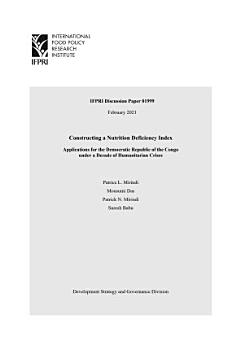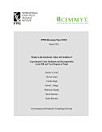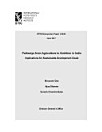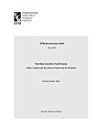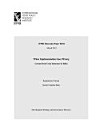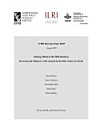Constructing a nutrition deficiency index: Applications for the Democratic Republic of the Congo under a decade of humanitarian crises
Mirindi, Patrice L. · Das, Mousumi · Mirindi, Patrick N. · Babu, Suresh Chandra
Feb 2021 · IFPRI Discussion Paper Buch 1 · Intl Food Policy Res Inst
E-Book
50
Seiten
family_home
Zulässig
info
reportBewertungen und Rezensionen werden nicht geprüft Weitere Informationen
Über dieses E-Book
The Democratic Republic of the Congo (DRC) is perennially plagued by prolonged phases of poverty, conflict, and increased internal migration, as well as pandemic outbreaks such as Ebola and COVID-19, and limited livelihood opportunities. Such unexpected or catastrophic events have rendered households vulnerable and resulted in poor health outcomes. Given this background, we intend to analyze the nutritional profile of households for a period spanning almost a decade using the Household Consumption Expenditure Survey (HCES). We construct a composite nutrition deficiency index (NDI), capturing intake of 14 different macro- and micronutrients (which we refer to as dimensions)—namely, calories, protein, calcium, zinc, folate, thiamine, niacin, iron, vitamin A, vitamin B12, vitamin D, vitamin B6, vitamin C, and vitamin E—using the popular Alkire-Foster methodology. This methodology, usually used to construct multidimensional poverty indexes, in this case helps measure the incidence, intensity, and combined extent of multinutrient deprivation. DRC’s values on the multidimensional NDI vary regionally from 0.13 to 0.73. Urban DRC performs worse than rural DRC. Regions subject to the conflict and Ebola crises are the worst-affected of the nutritionally deprived regions. Deficiency in calorie and protein intake contributes to the highest values of the NDI, but we also find evidence of a double burden of malnutrition, with households lacking consumption of both macro- and micronutrients. South Kivu is the worst-performing of all regions and Mongala the best. The northern parts of DRC have fewer nutritionally deprived households, as compared with the central and southwestern parts. Our main policy recommendation is to help improve market access in urban areas so that people consume a more diverse diet. In rural areas, the government should support improving nutrition-sensitive agricultural production. Although the World Food Programme has a sustained presence in the country, uplifting households from severe hunger, active participation by the government and collaboration with multiple stakeholders is called for.
Dieses E-Book bewerten
Deine Meinung ist gefragt!
Informationen zum Lesen
Smartphones und Tablets
Nachdem du die Google Play Bücher App für Android und iPad/iPhone installiert hast, wird diese automatisch mit deinem Konto synchronisiert, sodass du auch unterwegs online und offline lesen kannst.
Laptops und Computer
Im Webbrowser auf deinem Computer kannst du dir Hörbucher anhören, die du bei Google Play gekauft hast.
E-Reader und andere Geräte
Wenn du Bücher auf E-Ink-Geräten lesen möchtest, beispielsweise auf einem Kobo eReader, lade eine Datei herunter und übertrage sie auf dein Gerät. Eine ausführliche Anleitung zum Übertragen der Dateien auf unterstützte E-Reader findest du in der Hilfe.
